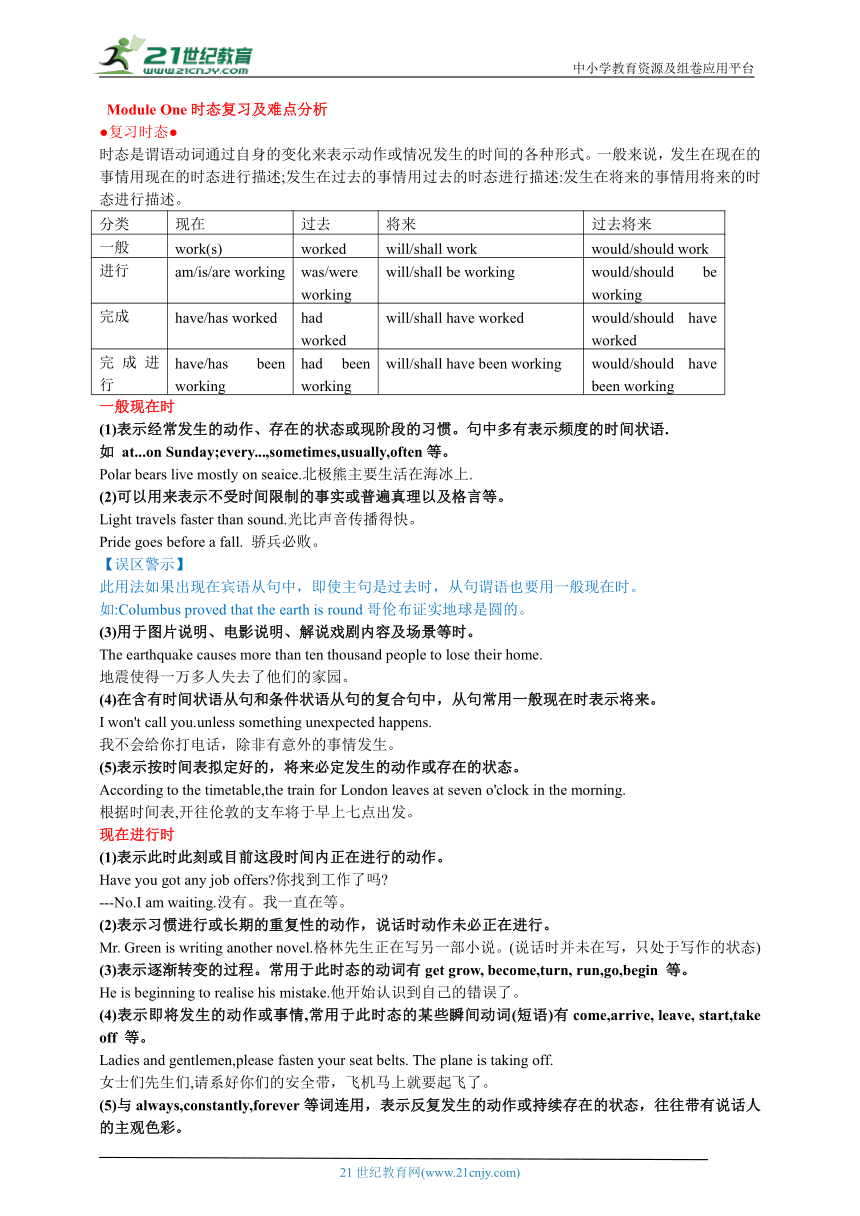
中小学教育资源及组卷应用平台 Module One时态复习及难点分析 ●复习时态● 时态是谓语动词通过自身的变化来表示动作或情况发生的时间的各种形式。一般来说,发生在现在的事情用现在的时态进行描述;发生在过去的事情用过去的时态进行描述:发生在将来的事情用将来的时态进行描述。 分类 现在 过去 将来 过去将来 一般 work(s) worked will/shall work would/should work 进行 am/is/are working was/were working will/shall be working would/should be working 完成 have/has worked had worked will/shall have worked would/should have worked 完成进行 have/has been working had been working will/shall have been working would/should have been working 一般现在时 (1)表示经常发生的动作、存在的状态或现阶段的习惯。句中多有表示频度的时间状语. 如 at...on Sunday;every...,sometimes,usually,often等。 Polar bears live mostly on seaice.北极熊主要生活在海冰上. (2)可以用来表示不受时间限制的事实或普遍真理以及格言等。 Light travels faster than sound.光比声音传播得快。 Pride goes before a fall. 骄兵必败。 【误区警示】 此用法如果出现在宾语从句中,即使主句是过去时,从句谓语也要用一般现在时。 如:Columbus proved that the earth is round哥伦布证实地球是圆的。 (3)用于图片说明、电影说明、解说戏剧内容及场景等时。 The earthquake causes more than ten thousand people to lose their home. 地震使得一万多人失去了他们的家园。 (4)在含有时间状语从句和条件状语从句的复合句中,从句常用一般现在时表示将来。 I won't call you.unless something unexpected happens. 我不会给你打电话,除非有意外的事情发生。 (5)表示按时间表拟定好的,将来必定发生的动作或存在的状态。 According to the timetable,the train for London leaves at seven o'clock in the morning. 根据时间表,开往伦敦的支车将于早上七点出发。 现在进行时 (1)表示此时此刻或目前这段时间内正在进行的动作。 Have you got any job offers 你找到工作了吗 --No.I am waiting.没有。我一直在等。 (2)表示习惯进行或长期的重复性的动作,说话时动作未必正在进行。 Mr. Green is writing another novel.格林先生正在写另一部小说。(说话时并未在写,只处于写作的状态) (3)表示逐渐转变的过程。常用于此时态的动词有get grow, become,turn, run,go,begin 等。 He is beginning to realise his mistake.他开始认识到自己的错误了。 (4)表示即将发生的动作或事情,常用于此时态的某些瞬间动词(短语)有come,arrive, leave, start,take off 等。 Ladies and gentlemen,please fasten your seat belts. The plane is taking off. 女士们先生们,请系好你们的安全带,飞机马上就要起飞了。 (5)与always,constantly,forever等词连用,表示反复发生的动作或持续存在的状态,往往带有说话人的主观色彩。 Why are you always complaining 你为什么总是抱怨 --Because you are always leaving your dirty socks on my bed. 因为你总是把脏袜子扔在我的床上。 一般过去时 (1)在确定的过去时间里所发生的动作或存在的状态。常用于一般过去时的时间状语有yesterday, last week, an hour ago, the other day 等。 When I called you this morning, nobody answered the phone.Where were you 今天早上我给你打电话时,没有人接电话。你在哪儿 (2)表示过去经常或反复发生的动作。 When I was a little boy, I often went there. 小时候,我经常去那儿。 (3)用于固定句式。 It is time sb.did sth.到某人做某事的时间了。 It is time you we ... ...
~~ 您好,已阅读到文档的结尾了 ~~